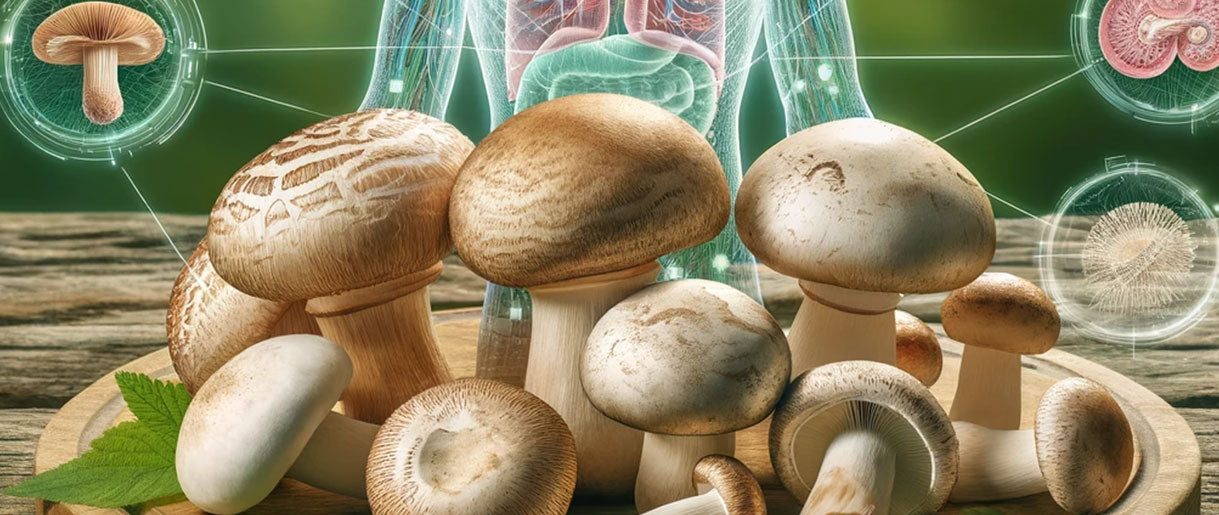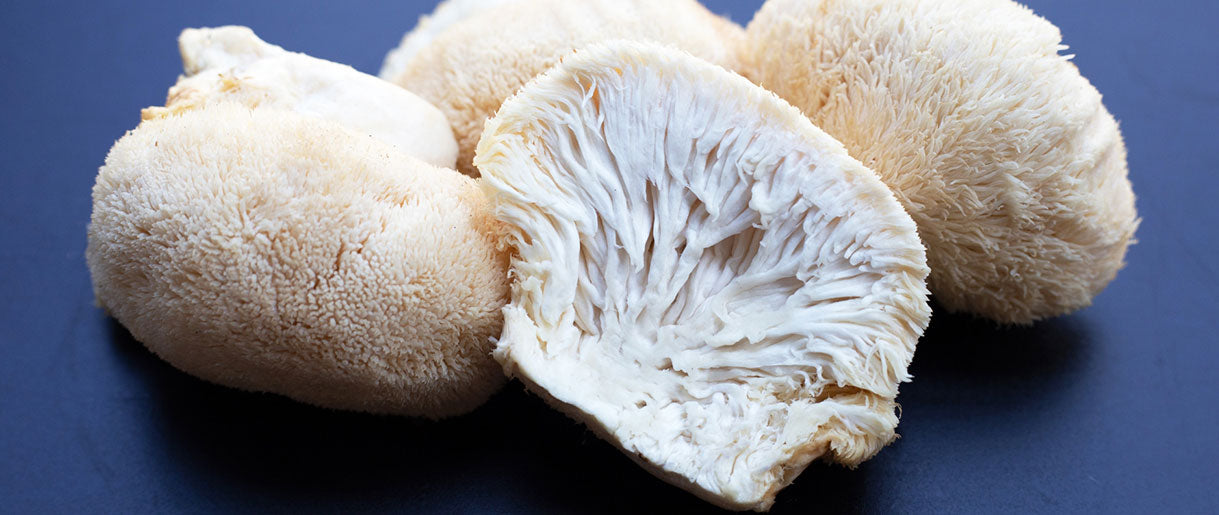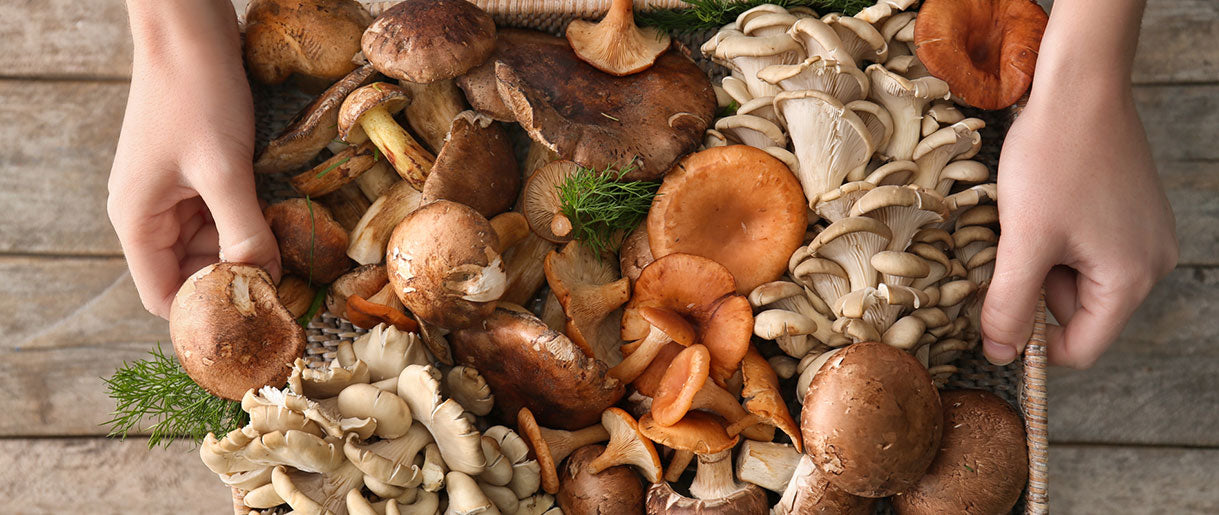Hey, have you ever thought about the secret health treasures hidden in nature? We mean, we're always hearing about some new 'superfood,' but what if we told you there's something truly special, and it's been under our noses (or feet) this whole time?
Yep, we are talking about mushrooms—but not just any part of them. There's something in them causing quite the buzz in health circles—mushroom polysaccharides.
Mushroom polysaccharides are a group of complex carbohydrates found in fungi, particularly in certain mushrooms like Shiitake, Reishi, and Maitake.
Why the fuss about them? Well, these aren't your average carbs. They've got some impressive health-boosting properties.
Think of them as your immune system's little helpers, potentially aiding in everything from keeping your body's defenses up to possibly playing a role in fighting inflammation and even cancer.
In this article, we will dive deep into mushroom polysaccharides. So, stick with us as we explore the impact of these remarkable natural compounds on our health and discover how we can incorporate them into our daily lives for a well-rounded approach to wellness.
What are Mushroom Polysaccharides?
Unraveling the Mystery of Mushroom Polysaccharides

Ever caught yourself wondering, "What the heck are mushroom polysaccharides anyway?" Well, let's crack this mystery open.
Imagine a world where edible mushrooms aren't just a pizza topping but a source of something much cooler. Polysaccharides in mushrooms are these complex carbohydrates—think of them as the mushrooms' superpowers.
They're the bioactive compounds that make medicinal mushrooms more than just food; they're like tiny health warriors fighting for our wellness. They are one of the reasons mushrooms have health benefits.
The Mushroom Hall of Fame

In the realm of medicinal mushrooms, some names stand out. Reishi (Ganoderma Lucidum), Shiitake, and Maitake are the A-listers rich in polysaccharide content.
But it's not just about being rich in dietary fiber; these mushrooms have unique structural characteristics that make them a big deal for human health. Each edible mushroom in this group packs its punch of health-boosting goodness.
From Fungi to Health: The Extraction Saga

Unlocking Mushroom Secrets: Diverse Extraction Methods
Extracting polysaccharides from mushrooms isn't a one-size-fits-all process. It's a bit like a culinary experiment, but for health!
Let's look at a few fascinating extraction methods scientists use to unlock these health-boosting compounds from mushrooms like Shiitake and Grifola frondosa (also known as Maitake).
Pressurized Hot Water Extraction: The Power of Heat and Pressure
Imagine using the power of heat and pressure to coax out those beneficial polysaccharides. That's what pressurized hot water extraction is all about.
It's a popular method in food chem for extracting water-soluble polysaccharides. This method ensures that the polysaccharides produced retain their beneficial properties.
Alcohol Extraction: The Traditional Approach
Alcohol extraction is like the traditional brewmaster's approach but for health. It involves using alcohol (usually ethanol) to dissolve and extract the polysaccharides. This method is great for pulling out those compounds that aren't easily water-soluble.
Dual Extraction: Best of Both Worlds
Why choose one method when you can have two? Dual extraction combines water and alcohol extraction.
This way, you get a full spectrum of water- and alcohol-soluble polysaccharides. Think of it as a comprehensive approach to ensure you're not missing out on any of the good stuff.
Enzyme-Assisted Extraction: The Cutting-Edge Method
Now, let's talk about something really cool—enzyme-assisted extraction. This is a more novel polysaccharide extraction method.
It uses specific enzymes to break down the cell walls of the mushrooms, making the extraction of polysaccharides more efficient.
This enzymatic method is like having a microscopic assistant that helps to gently release the polysaccharides, ensuring their integrity and potency.
Mushrooms: Your Tasty Health Hack

Next time you see edible mushrooms on your plate, consider them your tasty health hack. These medicinal mushroom varieties bring more to the table than just flavor—you will enjoy more than just the mushroom taste.
They are loaded with bioactive compounds and are a natural, unassuming source of essential nutrients and wellness. Whether sprinkling mushroom powder on your smoothie or brewing a mushroom tea, you're tapping into some of nature's magic for your human health.
The Science Behind the Magic: Proven Benefits of Mushroom Polysaccharides
1. Immune System: Nature's Own Defender

When beefing up your immune system, mushroom polysaccharides are like your body's personal bodyguards. Research (1) has consistently highlighted the role of immunomodulating polysaccharides in enhancing our body's defenses.
Picture these polysaccharides training your immune cells (like those dendritic cells we rarely think about) to be stronger and more alert. It's like turning your immune system into a superhero team, ready to protect you from nasty bugs and illnesses.
2. Antioxidant Support: The Invisible Shield

Ever heard of oxidative stress? It's like rust for your body, and here's where mushroom polysaccharides come in as your invisible shield. These fungi friends interact with antioxidant enzymes to reduce damaging oxidative stress(2).
This isn't just good for your skin or to keep you looking young; it's about protecting your cells from the inside out. Imagine these polysaccharides as tiny warriors, fighting off the cellular damage that life's stresses throw at you.
3. Anti-Inflammatory Properties: Calming the Storm Inside

Now, let's talk about inflammation—it's like a fire inside your body that sometimes gets out of control. This is where the crude polysaccharides from mushrooms step in, acting like a natural fire extinguisher.
Scientific research (3) has shown that these components have impressive anti-inflammatory effects. Whether it's a chronic condition like arthritis or just the occasional inflammation flare-up, these polysaccharides are like your internal peacekeepers, helping to cool things down.
4. Digestive Health: Your Gut's Best Friend

Gut health is all the rage now, and for good reason! The health of your gut is like the foundation of your overall well-being. The best mushrooms for gut health always have a high polysaccharide content.
Mushroom polysaccharides contribute significantly here by aiding the secretion of digestive enzymes and improving intestinal barrier function. Think of them as your gut's best friends, helping to balance the gut microbiota composition(4).
A healthy gut means better digestion, less bloating, and a happier you. Plus, when your gut is happy, it's easier for your body to absorb all those vital nutrients.
5. Potential Anti-Cancer Properties: A Natural Ally

Here's something that's really catching the eye of scientists—the potential anti-cancer properties of mushroom polysaccharides (5). The best mushrooms for cancer tend to have a high amount of polysaccharides.
While we're not saying they're a cure-all, research suggests(6) these compounds might help in the fight against cancer.
How?By boosting the immune system and fighting oxidative stress, they create an environment less favorable for cancer cells to thrive. It's like having a natural ally in your corner, helping your body defend itself against one of its most formidable opponents.
6. Supporting Your Gut Microbiota: Harmony Down Under

The gut is often called the body's second brain, and maintaining a healthy gut microbiota is vital to overall wellness. Mushroom polysaccharides are like the conductors of an orchestra in your gut, helping to nurture beneficial bacteria(7).
This harmony in your gut doesn't just mean better digestion; it's about boosting your mood, energy levels, and immune response. It's incredible how much these tiny components can do for the ecosystem inside you.
7. Enhanced Nutrient Absorption: Getting the Most Out of Your Food

It's not just what you eat, but how your body uses it. Thanks to mushroom polysaccharides, your body can get better at absorbing essential nutrients, including short chain fatty acids.
By influencing the human digestive enzymes secreted and the overall health of your gut, these compounds ensure that your body is making the most of the food you consume. It's like upgrading your body to a more efficient, nutrient-absorbing machine.
Mushroom Polysaccharides in Daily Life

Incorporating the Magic into Your Diet
So, how do you get these amazing mushroom polysaccharides into your diet? It's easier than you might think. Mushrooms aren't just for gourmet chefs; they're for everyone.
You can start simple—add mushrooms to your omelets, salads, or stir-fries. Remember, it's not just about taste; it's about transforming your meals into functional foods.
Mushroom Supplements: A Convenient Boost

If you're always on the go and cooking isn't your thing, no worries! Mushroom supplements are a great alternative.
They usually come in mushroom extracts or powders and are a straightforward way to get those beneficial polysaccharides. Remember, it's always a good idea to check with a healthcare professional before starting any supplement, especially to understand the right dosage for your needs.
Polysaccharide Isolated, Health Optimized
Some supplements feature polysaccharide isolated from specific types of mushrooms. This means you're getting a concentrated dose of those health-boosting compounds without worrying about intestinal permeability or other gut issues.
Delicious and Nutritious Mushroom Recipes

Now for the fun part—recipes! How about a Shiitake mushroom soup to warm you up? Or a Maitake mushroom stir-fry for a quick and healthy dinner? Well, you could also try our detailed Lion's mane mushroom recipes.
These recipes aren't just delicious; they turn your meal into a health-enhancing experience. By including a variety of mushrooms in your cooking, you're not just pleasing your taste buds but also giving your body a boost of those beneficial polysaccharides.
Precautions and Considerations
Navigating the World of Mushroom Supplements Safely

While mushroom polysaccharides are a natural wonder, it's essential to tread carefully. Like with any supplement, they're not without their nuances.
But you can enjoy your polysaccharides without dealing with the side effects of mushroom supplements. Here's the lowdown on staying safe while exploring these fungal friends' benefits.
Potential Side Effects: Listen to Your Body

First things first, let's talk about side effects. Generally, mushroom supplements are well-tolerated, but they're not a one-size-fits-all solution.
Some people might experience digestive upset, allergies, or even skin rashes. It's all about listening to your body. If you notice anything unusual, it's best to pause and reassess.
Medication Interactions: The Balancing Act

Now, this is crucial—the interaction with medications. Some mushroom polysaccharides can interact with certain medications, especially those affecting the immune system or blood clotting.
It's like a delicate dance where you must ensure both partners move harmoniously. So, if you're on medication, particularly for conditions like diabetes or hypertension, it's a good idea to have a chat with your healthcare provider.
Consulting Healthcare Providers: Your Health Team

Before jumping on the mushroom bandwagon, consulting with healthcare professionals is wise.
Whether it's your doctor, a dietitian, or a naturopath, getting a green light from them is crucial. They can help you understand if these supplements fit into your health regime, considering your health history and current medications.
Starting Slow: The Key to Smart Supplementation

Lastly,begin with a lower dosage if you get the all-clear to start taking mushroom supplements.
It's like dipping your toes into the water before diving in. This way, you give your body a chance to adjust, and you can monitor any reactions or benefits.
FAQs About Mushroom Polysaccharides
Can Mushroom Polysaccharides Support Digestive And Gut Health?
Yes, mushroom polysaccharides can significantly support digestive and gut health. They act as prebiotics in the digestive tract since digestive enzymes cannot break down many of their bonds.
This means these indigestible mushroom carbohydrates help maintain a healthy gut microbiome by feeding desirable microorganisms and keeping food moving efficiently through the digestive system.
Do Mushroom Polysaccharides Have Benefits For Metabolic And Heart Health?
Absolutely!
Apart from polysaccharides, functional mushrooms contain other bioactive substances like lectins, eritadenine, triterpenes, sterols, and phenolic compounds, which support metabolic health.
These compounds can contribute to lower blood pressure and healthier cholesterol, triglyceride, and blood sugar levels, aiding metabolic and heart health.
How Do Mushroom Polysaccharides Impact Immune Function?
Mushroom polysaccharides, particularly beta-glucans, support and activate the body's immune response.
They serve as biological response modifiers, enhancing the body's ability to fight off viral, bacterial, and fungal infections. This boost to the immune system is one of the key benefits of consuming mushrooms rich in polysaccharides.
Key Takeaways
As we've journeyed through the fascinating world of mushroom polysaccharides, it's clear that these natural wonders offer more than meets the eye.
From boosting our immune system to supporting gut health and even showing potential in metabolic and heart health, these compounds are like nature's hidden gems, waiting to enhance our well-being.
But remember, the magic of mushroom polysaccharides isn't just in their health benefits; it's in how they connect us back to nature and its potential to nurture our health.
Whether it's through adding mushrooms to our diet or incorporating supplements, we're tapping into an ancient source of wellness that has much to offer in our modern lives.
So, as we close this chapter, we invite you to open a new one in your health journey. Explore the possibilities that mushroom polysaccharides bring, and remember to consult with healthcare professionals to find the best way to integrate these wonders into your life.
We Want to Hear From You! Have you tried mushroom polysaccharides in your diet or as supplements? What was your experience? Or perhaps you have questions or insights to share?
Drop a comment below and join the conversation. Let's learn from each other and grow together in our journey towards natural health and wellness.
References
- Immunomodulatory effects of polysaccharides from edible fungus: a review, (1), https://www.sciencedirect.com/science/article/pii/S2213453021000483
- The Antioxidant Properties of Mushroom Polysaccharides can Potentially Mitigate Oxidative Stress, Beta-Cell Dysfunction and Insulin Resistance, (2), https://www.ncbi.nlm.nih.gov/pmc/articles/PMC9117613/
- Anti-inflammatory properties of edible mushrooms: A review, (3), https://pubmed.ncbi.nlm.nih.gov/29146352/
- Polysaccharide Regulation of Intestinal Flora: A Viable Approach to Maintaining Normal Cognitive Performance and Treating Depression, (4), https://www.frontiersin.org/articles/10.3389/fmicb.2022.807076/full
- Mushroom Polysaccharide-Assisted Anticarcinogenic Mycotherapy: Reviewing Its Clinical Trials, (5), https://www.ncbi.nlm.nih.gov/pmc/articles/PMC9267963/
- Anticancer properties of polysaccharides isolated from fungi of the Basidiomycetes class, (6), https://www.ncbi.nlm.nih.gov/pmc/articles/PMC3687424/
- The Interaction between Mushroom Polysaccharides and Gut Microbiota and Their Effect on Human Health: A Review, (7), https://www.ncbi.nlm.nih.gov/pmc/articles/PMC9856211/










Let Us Know Your Comments